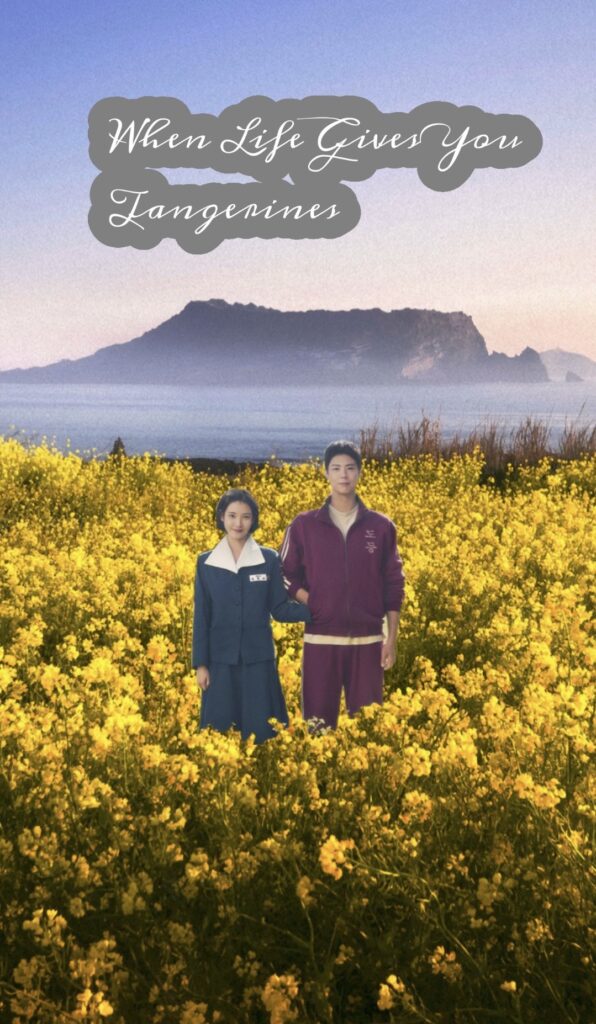
Hey! Has anyone ever eaten a tangerine at least once in their life? I’ve heard it’s a fruit that gives you a burst of both sweetness and sourness at the same time—kind of like life itself. Just like the phrase “when life gives you tangerines.”
Life has a way of showing us both sweet and sour moments. But the problem is, we rarely appreciate the sour ones. Instead of seeing the value in them, we often complain to God, asking, “Why am I in this position?” And honestly, that’s such a human response—we’re born imperfect, and it’s okay.
Now, you might be wondering, “Why is she suddenly talking about tangerines out of the blue?” And yes, you guessed it right. I’m talking about the newly released South Korean Netflix series “When Life Gives You Tangerines.”
I tried really hard not to watch it, but I just couldn’t resist. After the first episode, I was so overwhelmed that I told myself I wouldn’t continue—but somehow, the show pulled me in. There’s something about it, some hidden energy that keeps you glued to the screen. Once you start binge-watching it, you won’t be able to stop until the very end.
But let me make one thing clear—this isn’t just another pretty South Korean love story with a happy ending. No, dear. It’s so much more than that. This show takes you on a rollercoaster of emotions: happiness, sadness, remorse, and even guilt.
Yes, guilt.
You might wonder why guilt? Well, maybe because after watching this series, you’ll realize how often we live in the future, constantly chasing what’s next, instead of being present in the now. And the truth is, we don’t even know what the future holds.
The story centers around the lives of Ae-sun and Gwan-sik, and what it truly means to grow old in love. They lived on the breathtaking island of Jeju and were inseparable from the age of nine until their last breath. Ae-sun lost her mother at a young age, but in return, she gained a love that lasted a lifetime.
Gwan-sik carried the burden of guilt for never being able to send Ae-sun to college to pursue her dream of becoming a poet. He would often say, “You deserved a rich man.” But little did he know that Ae-sun considered herself the luckiest woman on earth just to have him by her side.
In a world obsessed with wealth, this made me pause and ask myself: Is money really everything? Or is it the peace, love, and contentment that matter more?
Every day, when my mother finishes her prayers, I ask her, “Did you pray that I become the most successful woman in our bloodline?” And she always replies, “No.” At first, it used to frustrate me. But when she explained, it changed everything. She said, “I pray that you become the happiest person in our bloodline.”
That moment hit me deeply. It made me realize how much our parents look out for us—just like Ae-sun, who still wanted her mother by her side even at the age of 70. No matter how old we get, we’ll always be that little girl craving her mother’s hug.
Ae-sun and Gwan-sik had three children whom they loved unconditionally. Ae-sun gave up her dream of becoming a poet, and Gwan-sik gave up his dream of being an athlete. But neither of them ever regretted it. They lived life hand in hand, facing every challenge together.
Spring was their favorite time of year. Each spring brought a new beginning, perhaps mirroring the magic of Jeju Island.
One of the most touching scenes was when Gwan-sik was on his deathbed and asked Ae-sun, “Were you happy with me?” And in her heart, Ae-sun thought, I was so happy—I couldn’t have imagined anything better.
Maybe that’s what real love looks like.
This show taught me that even in the toughest times, if you have your loved ones by your side, you can turn any moment into one of peace and joy.
So from now on, when life gives you tangerines—taste them. They might just be sweeter than you expected, and possibly the best thing you’ve ever had.
